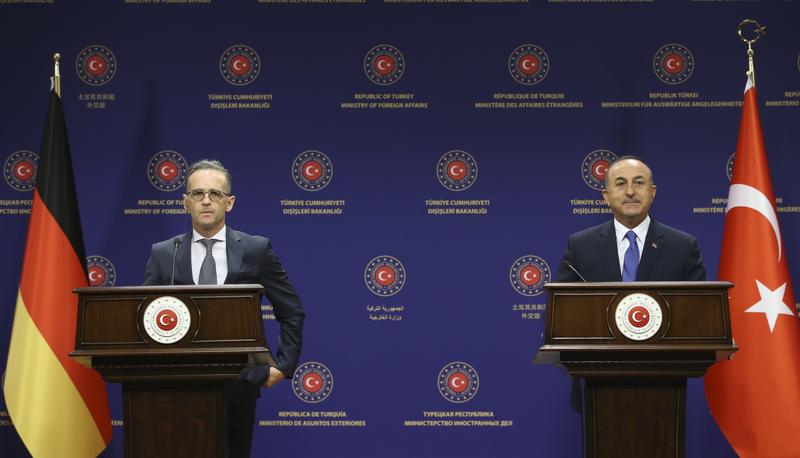 Turkey's Foreign Minister Mevlut Cavusoglu, right, and German counterpart Heiko Maas speak to the media after their talks, in Ankara, Turkey, Aug 25, 2020. (FATIH AKTAS / TURKISH FOREIGN MINISTRY VIA AP)
Turkey's Foreign Minister Mevlut Cavusoglu, right, and German counterpart Heiko Maas speak to the media after their talks, in Ankara, Turkey, Aug 25, 2020. (FATIH AKTAS / TURKISH FOREIGN MINISTRY VIA AP)
ATHENS/ANKARA - Germany’s top diplomat said after whirlwind meetings in Turkey and Greece on Tuesday the two were ready for dialogue to defuse a worsening dispute over energy resources in the Mediterranean, even as the NATO allies traded new barbs.
Tensions between Turkey and Greece escalated after Ankara sent its Oruc Reis survey vessel to disputed eastern Mediterranean waters this month, a move Athens called illegal
Turkey and Greece vehemently disagree over natural gas reserves off Cyprus and the extent of their continental shelves. They have drawn the European Union and nearby countries into the dispute, which earlier this month flared into a light collision between Turkish and Greek frigates.
On Tuesday, the foreign ministers of Greece and Turkey both said they wanted to solve the issue through dialogue following talks with German Foreign Minister Heiko Maas, but each warned that they would continue to defend their rights in the region.
ALSO READ: Turkey, Greece to hold rival naval drills as Germany aims to cool row
Tensions between Turkey and Greece escalated after Ankara sent its Oruc Reis survey vessel to disputed eastern Mediterranean waters this month, a move Athens called illegal.
After talks in Athens and Ankara, Maas urged Greece and Turkey to turn to dialogue, though added that Germany and the EU stood with fellow member state Greece.
“In both meetings in Athens as well as in Ankara I kept hearing that the only way to reach an understanding was to start a dialogue in which both differing standpoints were put on the table,” Maas told a news conference in Ankara.
“No one wants to settle this conflict militarily, which would be absolute madness,” he said, speaking alongside Turkish Foreign Minister Mevlut Cavusoglu.
Turkey and Greece meanwhile held rival military drills in the same theatre of the Mediterranean. Maas likened the dispute to “playing with fire” and warned that “every little spark can lead to catastrophe”.
Greece on Monday issued an advisory, known as a Navtex, that it will hold naval exercises in an area off the Greek island of Crete, after Turkey said on Sunday the Oruc Reis would operate in the same area until Aug. 27.
Greece’s advisory then prompted a rival Navtex from Turkey that it would also hold drills there on Tuesday.
Turkish President Tayyip Erdogan accused Greece on Monday of “sowing chaos” in the Mediterranean and warned Athens would find itself having to face the Turkish navy on its own.
War of words
Despite voicing readiness for dialogue, Cavusoglu said this could only happen if Greece abandoned its “maximalist demands”, adding it was not realistic to expect Turkey to drop its rights with threats of sanctions.
“We are open to talks without pre-conditions. But, when one side starts imposing pre-conditions, then there are many things we will put forth too,” he said.
“If you make statements like ‘We will defend our rights. We carry out drills,’ if you take wrong steps, we don’t want to say we will make a mistake, but we will do what is necessary without hesitation.”
Greek Foreign Minister Nikos Dendias said Greece wanted to talk with Turkey but would not do so “under threats”. Athens stood ready to defend its rights, he said, adding the dispute was an issue for the entire EU and its security.
Germany also intervened last month, prompting Ankara to pause operations for talks with Athens. After Greece and Egypt agreed a maritime demarcation deal, however, Turkey resumed operations.
READ MORE: Erdogan: No threats can deter Turkey's moves in Mediterranean
EU foreign ministers are scheduled to meet in Berlin on Aug 27-28 to discuss the issue. A senior EU official told reporters that the bloc’s EU foreign policy chief, Josep Borrell, would put “all options” on the table, including economic sanctions on Turkey and formally ending Turkey’s status as an EU candidate.
Asked about the bloc’s ties with Turkey, Maas said these were at a “crossroads” but Germany wanted to contribute to a positive dialogue. He said the course of EU-Turkey ties will “largely be decided” by the end of the year.


